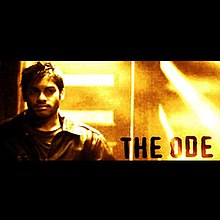The Ode
| The Ode | |
|---|---|

Original film poster
|
|
| Directed by | Nilanjan Neil Lahiri |
| Produced by | Ratna Maity (producer) Bharat Shah (exec. producer) |
| Screenplay by | Ghalib Shiraz Dhalla Akshat Verma (writer) |
| Story by | Ghalib Shiraz Dhalla (novel) |
| Starring |
Sachin Bhatt Wilson Cruz Sakina Jaffrey |
| Music by | Karsh Kale |
| Cinematography | Brandon Cox |
| Edited by | Nilanjan Neil Lahiri |
|
Release date
|
2008 |
| Language | English |
The Ode is a 2008 film directed by Nilanjan Neil Lahiri and starring Sachin Bhatt, Wilson Cruz and Sakina Jaffrey. The film is an adaptation of the critically acclaimed novel, Ode to Lata by Ghalib Shiraz Dhalla. The biopic was shot on location in Kenya and in Los Angeles and produced by Ratna Maity, with Bharat Shah as executive producer.
Thew storyline spans two generations of Indians. There is the doomed but passionate love story of Parin (Sakina Jaffrey) and Shiraz (Anil Kumar). This is intertwined with the life of their gay son Ali (Sachin Bhatt) who discovers that the past is always present no matter how far you run from it. Ali flees to Hollywood, away from his overprotective mother and the memories of his father's violent death.
A successful banker by day, at night Ali's life unravels in a blur of alcohol, drugs, and sex as he grapples with love, loss and ultimately, forgiveness. When his mother comes to Los Angeles to visit Ali in a last-ditch attempt to bring him back home and change his ways, the trapdoors of the past are flung open. Through Ali's struggle to break free and in his obsessive relationship with Richard (Diego Serrano), we glimpse into a troubled past he cannot escape and which threatens to destroy him unless he finds peace with his mother.
The Ode premiered at the Outfest Film Festival on July 17, 2008 to a sold-out audience. It was called "a beautiful portrait of the American experience for many first and second-generation Indian-Americans" (CineQueer, July 18, 2008) and a film with performances that are "memorable" and filled with "cinematic intensity" (Planet Homo, July 19, 2008). The UCLA Asia Institute praised it as a film that inspired "after-film contemplation" and boasting performances that are "noteworthy" (Asia Pacific Arts, August 8, 2008).
...
Wikipedia
